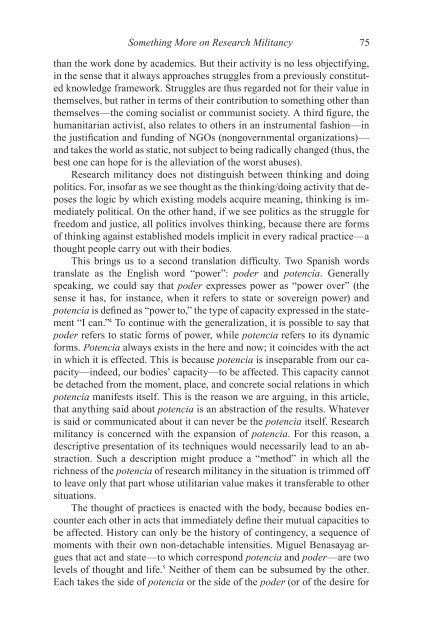CONSTITUENT IMAGINATION - autonomous learning
CONSTITUENT IMAGINATION - autonomous learning
CONSTITUENT IMAGINATION - autonomous learning
You also want an ePaper? Increase the reach of your titles
YUMPU automatically turns print PDFs into web optimized ePapers that Google loves.
Something More on Research Militancy<br />
75<br />
than the work done by academics. But their activity is no less objectifying,<br />
in the sense that it always approaches struggles from a previously constituted<br />
knowledge framework. Struggles are thus regarded not for their value in<br />
themselves, but rather in terms of their contribution to something other than<br />
themselves—the coming socialist or communist society. A third figure, the<br />
humanitarian activist, also relates to others in an instrumental fashion—in<br />
the justification and funding of NGOs (nongovernmental organizations)—<br />
and takes the world as static, not subject to being radically changed (thus, the<br />
best one can hope for is the alleviation of the worst abuses).<br />
Research militancy does not distinguish between thinking and doing<br />
politics. For, insofar as we see thought as the thinking/doing activity that deposes<br />
the logic by which existing models acquire meaning, thinking is immediately<br />
political. On the other hand, if we see politics as the struggle for<br />
freedom and justice, all politics involves thinking, because there are forms<br />
of thinking against established models implicit in every radical practice—a<br />
thought people carry out with their bodies.<br />
This brings us to a second translation difficulty. Two Spanish words<br />
translate as the English word “power”: poder and<br />
potencia. Generally<br />
speaking, we could say that poder<br />
expresses power as “power over” (the<br />
sense it has, for instance, when it refers to state or sovereign power) and<br />
potencia is defined as “power to,” the type of capacity expressed in the state-<br />
ment “I can.” 4 To continue with the generalization, it is possible to say that<br />
poder refers to static forms of power, while<br />
potencia refers to its dynamic<br />
forms. Potencia always exists in the here and now; it coincides with the act<br />
in which it is effected. This is because potencia is inseparable from our capacity—indeed,<br />
our bodies’ capacity—to be affected. This capacity cannot<br />
be detached from the moment, place, and concrete social relations in which<br />
potencia manifests itself. This is the reason we are arguing, in this article,<br />
that anything said about potencia is an abstraction of the results. Whatever<br />
is said or communicated about it can never be the potencia itself. Research<br />
militancy is concerned with the expansion of potencia. For this reason, a<br />
descriptive presentation of its techniques would necessarily lead to an abstraction.<br />
Such a description might produce a “method” in which all the<br />
richness of the potencia of research militancy in the situation is trimmed off<br />
to leave only that part whose utilitarian value makes it transferable to other<br />
situations.<br />
The thought of practices is enacted with the body, because bodies encounter<br />
each other in acts that immediately define their mutual capacities to<br />
be affected. History can only be the history of contingency, a sequence of<br />
moments with their own non-detachable intensities. Miguel Benasayag argues<br />
that act and state—to which correspond potencia and poder—are two<br />
levels of thought and life. 5 Neither of them can be subsumed by the other.<br />
Each takes the side of potencia or the side of the poder<br />
(or of the desire for
















